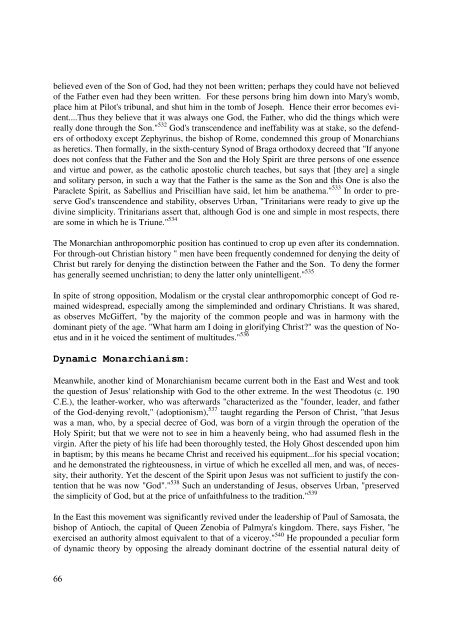Scripture and God in Christianity
Scripture and God in Christianity
Scripture and God in Christianity
Create successful ePaper yourself
Turn your PDF publications into a flip-book with our unique Google optimized e-Paper software.
elieved even of the Son of <strong>God</strong>, had they not been written; perhaps they could have not believed<br />
of the Father even had they been written. For these persons br<strong>in</strong>g him down <strong>in</strong>to Mary's womb,<br />
place him at Pilot's tribunal, <strong>and</strong> shut him <strong>in</strong> the tomb of Joseph. Hence their error becomes evident....Thus<br />
they believe that it was always one <strong>God</strong>, the Father, who did the th<strong>in</strong>gs which were<br />
really done through the Son." 532 <strong>God</strong>'s transcendence <strong>and</strong> <strong>in</strong>effability was at stake, so the defenders<br />
of orthodoxy except Zephyr<strong>in</strong>us, the bishop of Rome, condemned this group of Monarchians<br />
as heretics. Then formally, <strong>in</strong> the sixth-century Synod of Braga orthodoxy decreed that "If anyone<br />
does not confess that the Father <strong>and</strong> the Son <strong>and</strong> the Holy Spirit are three persons of one essence<br />
<strong>and</strong> virtue <strong>and</strong> power, as the catholic apostolic church teaches, but says that [they are] a s<strong>in</strong>gle<br />
<strong>and</strong> solitary person, <strong>in</strong> such a way that the Father is the same as the Son <strong>and</strong> this One is also the<br />
Paraclete Spirit, as Sabellius <strong>and</strong> Priscillian have said, let him be anathema." 533 In order to preserve<br />
<strong>God</strong>'s transcendence <strong>and</strong> stability, observes Urban, "Tr<strong>in</strong>itarians were ready to give up the<br />
div<strong>in</strong>e simplicity. Tr<strong>in</strong>itarians assert that, although <strong>God</strong> is one <strong>and</strong> simple <strong>in</strong> most respects, there<br />
are some <strong>in</strong> which he is Triune." 534<br />
The Monarchian anthropomorphic position has cont<strong>in</strong>ued to crop up even after its condemnation.<br />
For through-out Christian history " men have been frequently condemned for deny<strong>in</strong>g the deity of<br />
Christ but rarely for deny<strong>in</strong>g the dist<strong>in</strong>ction between the Father <strong>and</strong> the Son. To deny the former<br />
has generally seemed unchristian; to deny the latter only un<strong>in</strong>telligent." 535<br />
In spite of strong opposition, Modalism or the crystal clear anthropomorphic concept of <strong>God</strong> rema<strong>in</strong>ed<br />
widespread, especially among the simplem<strong>in</strong>ded <strong>and</strong> ord<strong>in</strong>ary Christians. It was shared,<br />
as observes McGiffert, "by the majority of the common people <strong>and</strong> was <strong>in</strong> harmony with the<br />
dom<strong>in</strong>ant piety of the age. "What harm am I do<strong>in</strong>g <strong>in</strong> glorify<strong>in</strong>g Christ?" was the question of Noetus<br />
<strong>and</strong> <strong>in</strong> it he voiced the sentiment of multitudes." 536<br />
Dynamic Monarchianism:<br />
Meanwhile, another k<strong>in</strong>d of Monarchianism became current both <strong>in</strong> the East <strong>and</strong> West <strong>and</strong> took<br />
the question of Jesus' relationship with <strong>God</strong> to the other extreme. In the west Theodotus (c. 190<br />
C.E.), the leather-worker, who was afterwards "characterized as the "founder, leader, <strong>and</strong> father<br />
of the <strong>God</strong>-deny<strong>in</strong>g revolt," (adoptionism), 537 taught regard<strong>in</strong>g the Person of Christ, "that Jesus<br />
was a man, who, by a special decree of <strong>God</strong>, was born of a virg<strong>in</strong> through the operation of the<br />
Holy Spirit; but that we were not to see <strong>in</strong> him a heavenly be<strong>in</strong>g, who had assumed flesh <strong>in</strong> the<br />
virg<strong>in</strong>. After the piety of his life had been thoroughly tested, the Holy Ghost descended upon him<br />
<strong>in</strong> baptism; by this means he became Christ <strong>and</strong> received his equipment...for his special vocation;<br />
<strong>and</strong> he demonstrated the righteousness, <strong>in</strong> virtue of which he excelled all men, <strong>and</strong> was, of necessity,<br />
their authority. Yet the descent of the Spirit upon Jesus was not sufficient to justify the contention<br />
that he was now "<strong>God</strong>"." 538 Such an underst<strong>and</strong><strong>in</strong>g of Jesus, observes Urban, "preserved<br />
the simplicity of <strong>God</strong>, but at the price of unfaithfulness to the tradition." 539<br />
In the East this movement was significantly revived under the leadership of Paul of Samosata, the<br />
bishop of Antioch, the capital of Queen Zenobia of Palmyra's k<strong>in</strong>gdom. There, says Fisher, "he<br />
exercised an authority almost equivalent to that of a viceroy." 540 He propounded a peculiar form<br />
of dynamic theory by oppos<strong>in</strong>g the already dom<strong>in</strong>ant doctr<strong>in</strong>e of the essential natural deity of<br />
66
















